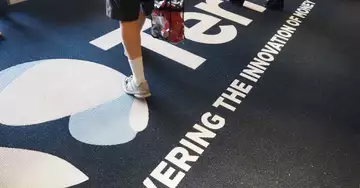WASHINGTON, D.C. - Terra may be on the ropes after last week's dramatic death spiral, but the cryptocurrency's name is still emblazoned loudly on the pitch of Major League Baseball's Washington Nationals.
As the team wrapped up a series against the Houston Astros on Sunday, CoinDesk went to see if the $38.5 million advertising deal had worked. Had people in the stadium heard of Terra? Had anyone bought the asset, which is now worth far less than a penny than when it traded at $115 on opening day a few months ago?
The responses of stadium employees and visitors suggest that they had not. Few had heard of Terra's demise, despite the attention it has attracted in the cryptosphere, and even fewer owned the asset or any cryptocurrency at all. One elevator operator said Terra was Latin for "dirt."
Still, Terra could be a name Nationals fans eventually recognize. In February, LUNAtics agreed to a proposal to place the blockchain name on the stadium's branding for the next five years, with payment for the deal upfront and in U.S. dollars.
The deal includes having the Terra logo embroidered into the high-priced seats behind home plate that are highly visible during broadcasts, as well as naming rights to the "Terra Club," the stadium's all-inclusive dining lounge reserved for luxury fans.
Whether the Nationals will hold up their end of the bargain remains to be seen, as do plans to accept payments in UST for next season. Representatives for the franchise declined CoinDesk's repeated request for comment and were not available for interviews at Sunday's game.
Crypto companies seeking sports sponsorships, like the Nationals' deal with Terra, have been a regular occurrence over the past year. Another MLB sponsorship came from crypto exchange FTX, whose logo was featured on the uniforms of the game's umpires. The deal between the Nationals and Terra, while not the only protocol tie-up in the league (e.g. Mets/Tezos), is certainly the first high-profile failure.
But corporate sports sponsorship has a long history of failure. Enron Field (a $100 million naming rights deal that lasted only two of the planned 30 years) and Webvan (whose logo was emblazoned on 42,000 drink holders long after the dot-com crash of 2001) are well-known marketing flops.
That's not to say that Nationals supporters were completely in the dark about Terra. One man sitting in the Terra Club was well aware of the billion-dollar implosion; on Sunday, he told his friends how that one coin went to zero.
The fan told CoinDesk that he didn't own any cryptocurrencies and wasn't interested in changing that, especially after Terra. An avid Nationals fan, he expressed something between dismay and sullen acceptance for a deal the Nationals made "for the money." He was glad to hear Terra had paid up front.
Of the two dozen or so people CoinDesk spoke to, only one, an usher in a nearby area, knew the details of last week's stunning collapse.
Another, a bartender at Terra Club, knew Terra was a bitcoin of sorts and seemed to know it had had a rough week. She said she didn't have any money to invest in it and didn't plan to, but had heard it was "coming back."
The Astros defeated the Nationals 8-0, ending the series on the strength of five strong innings from perennial ace Justin Verlander.

